Tuesday, October 31, 2006
Travelling to South Carolina...
'That's cool.' A boy looks over New Jersey during take-off from Newark airport. The kid was right.
'Excuse me, are those designer frames?' In Atlanta, an airline employee compliments my style. Baffled and speechless, I take my glasses off, and let him find out the answer for himself.
'Hello, hello.' The flight attendant welcomes me aboard the plane to Savannah.
'You aren't from around here, are you?' One of the locals welcomes me to Beaufort, South Carolina.
'...his striking Scottish inflection.' Scott Dance, reporter on The Beaufort Gazette, breaks new ground in the science of diplomatic descriptions of foreigners.
Check out the Flash Box on my Bebo page for video footage of my trip. I hope to post some photos of the event itself soon.
Friday, October 27, 2006
The beginning of the end?
On the other hand, just read some of the comments in the Scotsman article - if you are in the Church of Scotland, weep for the shame that we bring to the name of Christ in all this.
Work Rest and Play
Work is beginning to mount up. Although I didn't plan to sit any mid-term exams, I might do the mid-term exam in my history class. The alternative is to write a 4000 word paper. But, a 50 minute written exam is less intensive. I'd love to write a paper on W.G.T. Shedd's philosophy of history, but not sure the effort would be worth it.
One book I've read this week is A Theology for the Social Gospel by Walter Rauschenbusch. I found the following quote astonishing, if only because it is still applicable almost a century after it was written:
'Doctrinal theology is in less direct contact with facts than other theological studies. Exegesis and church history deal with historical material and their business is to discover facts. New facts and the pressure of secular scientific work compel them to revise their results and keep close to realities. Doctrinal theology deals with less substantial and ascertainable things. It perpetuates an esoteric stream of tradition. What every church demands of its systematic theologians is to formulate clearly and persuasively what that church has always held and taught. If they go beyond that they are performing a work of supererogation for which they do not always receive thanks.'
This quote is remarkable when compared with my reading of Mark Strom's Reframing Paul. Strom describes evangelical preaching as a tool which surrenders theological and exegetical method in order to validate an existing system of thought and practice. Strom quotes from a significant Reformed evangelical book, The Preacher and Preaching, to illustrate this characteristic: systematic theology is normative, the system of truth elucidates every text, the system of doctrine exercises control over the exposition of a particular passage.
Other applications include the ordination of women - why the huge debate over women, when the question of ordination is less than clear in the New Testament? Both sides in the argument perpetuate the same church system. I would vouch that this can be seen in many churches that ordain women - what has the ordination of women achieved in terms of progressing and improving church life. Women are now free to fill roles that stifle the kingdom of God rather than encourage it. Was the dream of women's ordination in Presbyterianism simply the perpetuation of the traditional roles of elder and minister? If so, the ordination of women has been a remarkable success. If not, then I hope and pray that some people are still dreaming dreams.
I'm finding other classes difficult - there is too much I want to read and think over. But, my background reading for papers usually reveals top quality papers and articles already saying exactly what I want to say. Sinclair B Ferguson, Carl Trueman, and Alan Spence have written on Owen's Spirit-Christology already - I'd just be summarising and covering their work if I wrote on it myself - still, it is a fascinating area. I can't wait to read Spence's dissertation on Owen's christology, due to be published next year.
Other residents in Alex live in bemusement - note the reference to 'The Scotsman' on the Thurday reads of this blog. At least Jenny worked out I'm from Scotland. Iceland, Germany, Ireland, and Australia top the list of countries people guess I'm from - what's the German for 'Helllooooo!!' again?
Friday, October 20, 2006
Mark Noll on Race, Religion and American Politics
Noll’s book was fascinating, interesting. However, I was left wondering about what Noll was really getting at - I thought he was theologically naïve. The history was impressive - but I pretended that my theological view was safely detached from Noll’s critique of evangelicalism and fundamentalism. But I knew that Noll was getting at something, a problem with the movement that brought me to a living faith in Jesus Christ. I was frustrated that The Scandal of the Evangelical Mind told the story without solving any of the theological problems inherent in that story. In some ways, my development as a Christian reader of history and theology has wrestled with Noll’s thesis ever since.
Last night I had the privilege of hearing Noll’s last lecture in a series of three public lectures given at Princeton University. It is safe to say that I no longer doubt Noll’s historical or theological insights. Even if the last lecture relied on other authorities on 20thC American history, Noll’s development of his views on race and religion in American politics deserves to be widely discussed because it has the potential to explain the weaknesses of evangelical Christianity today.
The lecture series developed Noll’s earlier work, found in America’s God: From Jonathan Edwards to Abraham Lincoln (2002) and The Civil War as a Theological Crisis (2006). (You can read reviews of these works here and here.) Basically, Noll argued that the Civil War solved the problem of religion and slavery. But the problem of religion and race remained. It remained right up to the mid-20th century, and, by implication, to the present day. White American Christianity developed alongside an essentially separate Black Christianity. This black prophetic religion was a significant trigger for the Civil Rights movement of the 1950s and 1960s.
White Christian ‘elites’ accepted and often promoted civil rights. But there was a consequence to this acceptance of federal promotion of civil rights. Resentment shifted to the expansion of federal government. A coalition between Republican and white evangelical interests grew out of this to form the current conservative power block. Illustrations of this resentment include the growth of creationism - a phenomenon that Noll linked to the investment in public scientific education that was funded by federal government in the late 1950s and 1960s. This federal policy was viewed as an imposition on local Christian values, because public science was inevitably the science of Darwin and evolution, and it was therefore anti-Christian. I was reminded of the scandal of the evangelical mind at this point.
This post is too long already - the lecture series was full of stories that made me cringe. Noll’s comparison of moral religious support for the Civil War, and the moral religious basis of the Civil Rights movement was chilling. Chilling, because in the 1860s white men fought and killed each other in the name of God. In the 1950s and the 1960s, black people fought against injustice and racism using, among other things, public prayer and preaching.
Noll spoke as a white evangelical. He admitted that America was a highly successful country, and a place where millions of people have benefited from values originating in American Protestantism. He ended his talk by positing a ‘Calvinist theological interpretation of a problem caused by “Calvinists”’ But, I will need to get the book before I think about this some more. The lectures will be published by Princeton University Press some time next year.
Monday, October 16, 2006
Sunday, October 15, 2006
Introducing Mr Nick Preuninger
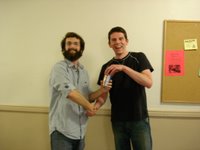
Congratulations to Nick, winner of the Irn Bru competition. Nick is one of the many students at PTS who aspire. I'm not sure what he aspires to, but that doesn't matter - on the fourth floor of Alexander Hall you just need to glow aspiration. And Nick, as you can see, knows how to glow.
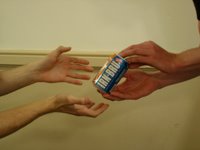
Thanks to Noah Carlson for taking the pictures. Nick and Noah are founding members of the 4th Alex Fraternal. More on that later.
PS - it's a big secret - don't tell anyone about it...
Football
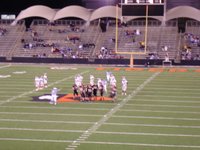 My first football game. Princeton Tigers v Brown - a college game. These pictures aren't great - but I was chuffed to catch video footage of the first touchdown on my camera - I just don't know how to post movie clip footage on blogger.
My first football game. Princeton Tigers v Brown - a college game. These pictures aren't great - but I was chuffed to catch video footage of the first touchdown on my camera - I just don't know how to post movie clip footage on blogger. The first half was rather dull - I tried to read Mark Strom's Reframing Paul - but it was too cold.
The first half was rather dull - I tried to read Mark Strom's Reframing Paul - but it was too cold.
 Benjamin is one of my friends from the international students' orientation week. An up-and-coming German scholar, Benjamin is a doctoral research student looking at the influence of Karl Barth on Hans Urs von Balthasar. Benjamin is one of the few people here that understands the implications of the Jesus of history/Christ of Faith debate. The hours fly in at the Tap Room when we discuss ideas of revelation over some Samuel Adams lager - possibly the nicest American beer I've tried so far - the quality of the conversation is usually poor, at least the Protestant contribution!!
Benjamin is one of my friends from the international students' orientation week. An up-and-coming German scholar, Benjamin is a doctoral research student looking at the influence of Karl Barth on Hans Urs von Balthasar. Benjamin is one of the few people here that understands the implications of the Jesus of history/Christ of Faith debate. The hours fly in at the Tap Room when we discuss ideas of revelation over some Samuel Adams lager - possibly the nicest American beer I've tried so far - the quality of the conversation is usually poor, at least the Protestant contribution!!
Wednesday, October 11, 2006
Postmillennial rhetoric: no. 1
'The Messianic Kingdom' Charles Elliott
The Presbyterian Review Vol. 3 No. 10 (1882), p 238.
Saturday, October 07, 2006
Home comforts
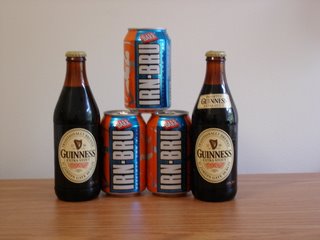
A can of Irn-bru to the first Princeton Theological Seminary student who gets in touch with me through my blog. (I've no idea if anyone reads itothehills.)
I plan to auction the other two. Kieran Dodds showed me a shop in Greenwich, New York, that sold all things British - including Barr's finest fizzy pop.
Only thing is, ain't no sausage supper shops in Princeton. If anyone knows otherwise, two cans of Irn-bru to you.
Kirkin' o' the Tartan
Just before I left Glasgow for Princeton in September, I bumped into one of my old D&T colleagues. He was a guy who left D&T to travel the States with his girlfriend selling shoes at Scots Highland conventions. Seriously! At the time we were told there was a market for this kind of thing. People just lapped up the traditional Scottish Highland dress thing, and, if you are going to wear a kilt, you need the right kind of shoes, right?

I thought about Nick yesterday as I read an invitation to preach in South Carolina, at a Kirkin' o' the Tartan event. The invitation came through the seminary. A former student was looking for 'a real Scot' to speak at an event in his church. Apart from Prof Torrance, I'm the only real Scot here, at least among the student population.
Yikes! I've been here one month, and already I'm buying into the whole thing! A funny little providence makes all this seem appropriate. I'm at PTS through the Peter Marshall Bursary scholarship, set up between Trinity College, Glasgow, and Princeton Theological Seminary. Peter Marshall was a Scot who came to America as a young man in 1927, became a Presbyterian minister, and ended up as chaplain to the US Senate in Washington D.C. Marshall, to some extent at least, contributed to the Kirkin' o' the Tartan tradition in the States.
So, I'm stepping into the breach, and carrying on the testimony to Scottish pride of place in the US. Jack McConnell can be proud - I just hope I look as good as he did on my own big day in tartan.
New York

Okay, so, I'm in Princeton, New Jersey. I'm going about my business, and I get a call on my cell phone. It's Kieran Dodds, international man of mischief. He tells me he's on a tour of the States, drummin' up business, checkin' out opportunities to consolidate his growing domination of the photo-journalistic world.
He's staying in the City. He wants to meet - but he needs to see some big cheese first. I tell him I'll head to Penn station, and wait for his call.
We end up going for some food. Kieran is a pro, but chop sticks lend opportunity for him to show his fun side. At heart, he's a big kid in a big city. Luckily, we've got good company to guide us.
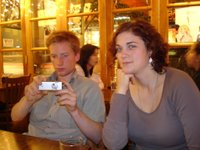
Friday

Friday was a good day. The next two or three posts are based on events or opportunities that materialised yesterday. In the midst of all these things I'm falling in love with the States, I'm realising just how weird and crazy the place is, and, just maybe, I'm selling out on being cool young and sorted. I'm buying into the dream!
Here's is a photo of Time Square. And, as for the photo of me looking cool in the City, what I'm drinking will become apparent as you read later posts...

Monday, October 02, 2006
Funeral Songs
If I was forced to choose a Sinatra song for my own funeral, I'd go with something just a little different. The one about Chicago being my kind of town, perhaps. Or maybe Come Fly With Me, or, the one about the tall tanned young lovely girl from Ipanema. Anything that avoids thinking about death.
How come we use pop songs all wrong? I hear James Blunt's 'You're Beautiful' is really popular at weddings and stuff. That's really stupid when you think about it.
Or maybe it's not. Maybe the whole point is that we avoid thinking about meaning, because we've given up on any value or truth in our communications. The end is all that matters - if a piece of music evokes a mood, who cares about the words? Alternatively, if the words of a song are good, who cares if the tune has other associations - but that's another gripe of mine, for another post.
Silly Shed
So, I think to myself, 'Hey! the Dinky ride ain't too long. I'll walk it.'
So, I start walking into the New Jersey darkness. I reckon that if I follow the rail track I'll be fine. Only thing is, it's dark. But I persuade myself that sooner or later I'll see the bright lights of Princeton. Sooner or later, I decide I'm not going to see the bright lights of Princeton soon. I'm on Alexander Rd. I come to a junction I recognise, but the sign is for Trenton. I've just been there, and I don't want to go back.
So, I walk in the opposite direction. But I'm getting nowhere fast. My innate survival instincts kick in. Should I text one of my friends at the seminary? No, that would be embarrassing. Luckily, my survival instincts tell me that I know the way back to Princeton Junction station.
So, I get back on to Alexander Rd. I walk back to Princeton Junction station, just in time to hear the Dinky horn tooting as it leaves again for Princeton. I'm sweating, but I'm safe. I wait for the next ride, thinking about the New Jersey darkness that my survival instincts delivered me from.
So, I get back to Princeton on the next ride. I struggle along the street to Wawa for a coffee and donut. I need sugar fast. As I wander up the street to the seminary, I realise that I'm walking along Alexander Rd...
So, remember, don't be a silly Shed. Never go for a walk in a strange place at night, even if your sense of direction is as good as mine. All roads will take you places - few will take you where you want to go.